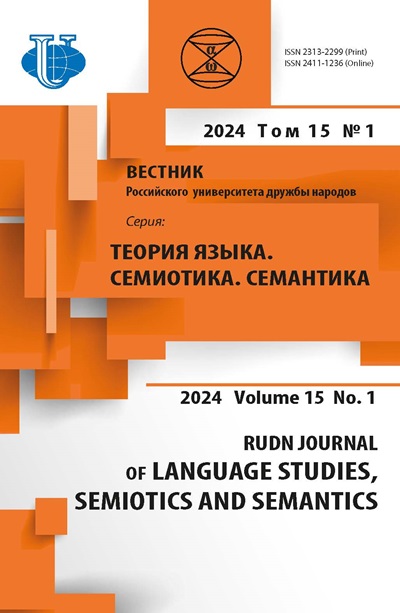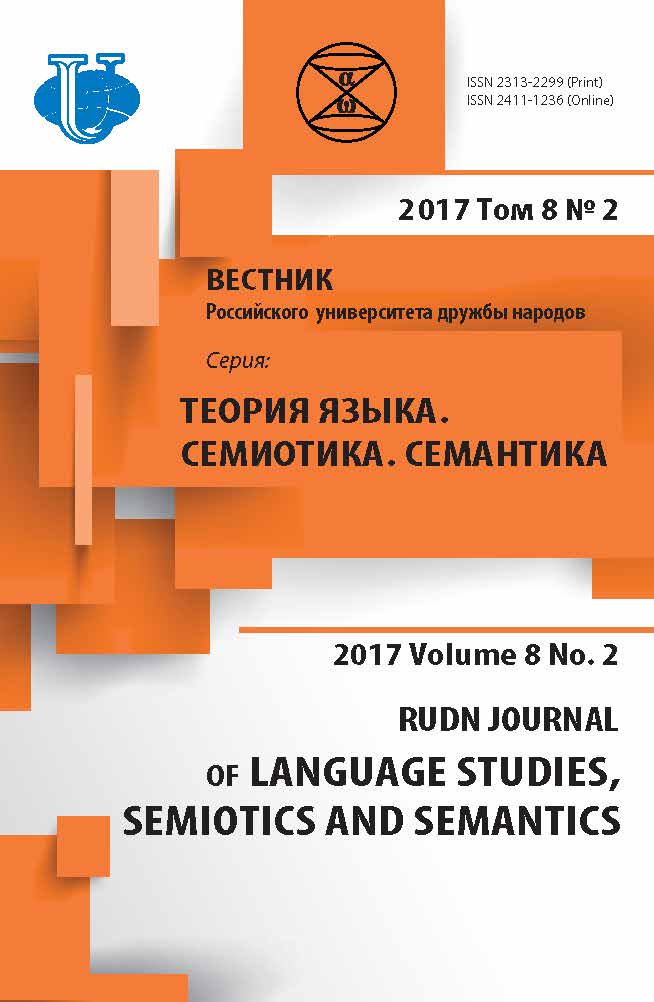Peculiarities of Verbal and Artistic Implementation of the Concept “Citizenship” in the Poetry of E.A. Evtushenko
- Authors: Kornakova E.S.1
-
Affiliations:
- National Research University “Higher School of Economics”
- Issue: Vol 8, No 2 (2017)
- Pages: 464-471
- Section: Articles
- URL: https://journals.rudn.ru/semiotics-semantics/article/view/16357
- DOI: https://doi.org/10.22363/2313-2299-2017-8-2-464-471
Cite item
Full Text
Abstract
The article is aimed at the research and the description of the pecularities of verbal and artistic implementation of the concept “citizenship” in the works of E.A. Evtushenko, as well as the research of the structure and verbal realizations of the concept «citizenship» prepared on the basis of poet's works. This article reveals the core and periphery of this concept in Russian language picture of the world. The urgency of this Article is determined by the following factors: 1) the scrutiny of modern science to issues of conceptual analysis of the text; 2) an increased interest in identifying the specifics of artistic paintings of individual writers of the world; 3) citizenship unexplored theme in the works of E.A. Yevtushenko. The purpose of the article - the study and description of the characteristics of verbal and artistic expression of the concept of “citizenship” in the works of E.A. Yevtushenko, the study of the structure and implementation of verbal concept “citizenship” on the material of the artistic works of E.A. Yevtushenko. The material of the study is based on a poem E.A. Yevtushenko, objectifying the analyzed concept. The main research method used a special method of linguistic - conceptual analysis. To expand and clarify the lexical content of the concept “citizenship” in the system of the Russian language was used lexicographical material: V.I. Dal “Explanatory Dictionary of Russian Language”; S.I. Ozhegov Dictionary of Russian language; Dictionary of Russian ed. A.P. Evgenyeva, Explanatory Dictionary of Russian ed. D.N. Ushakov and others.
Keywords
About the authors
Ekaterina Sergeevna Kornakova
National Research University “Higher School of Economics”
Author for correspondence.
Email: ammiak@inbox.ru
20, Мyasnitskaya str., Moscow, Russia, 101000
References
- Boldyrev, N.N. (2014). Cognitive semantics. Introduction to Cognitive Linguistics. Tambov: TSU. (in Russ).
- Vishnyakova, O.V. (1984). Dictionary of paronyms of the Russian language. Moscow: Russkii yazyk. (in Russ).
- Dal, V.I. (1955). Explanatory Dictionary of Russian language. Moscow. (in Russ).
- Denissenko, V.N. (2004). Concept Change in the Russian language picture of the world. Moscow: RUDN. (in Russ).
- Evtushenko, E.A. (1984). Collected Works. Vol. 2. Moscow: Khudozhestvennaya literatura. (in Russ).
- Evtushenko, E.A. (1980). Collected Works. Vol. 1. Moscow: Khudozhestvennaya literatura. (in Russ).
- Popova, Z.D. & Sternin, I.A. (2001). Essays on Cognitive Linguistics. Voronezh: Istoki. (in Russ).
- Novikov, L.A. (2001). Problems of linguistic significance. Selected works. Volume 1. Moscow: Publishing house of RUDN. (in Russ).
- Ozhegov, S.I. (1972). Explanatory dictionary of the Russian language. Moscow. (in Russ).
- Ushakov, D.N. (Ed.) (2008). Russian language Dictionary. Moscow. (in Russ).
- Evgenieva, A.P. (Ed.) (1981—1984). Russian dictionary in 4 volumes. Moscow: Russian language. (in Russ).













